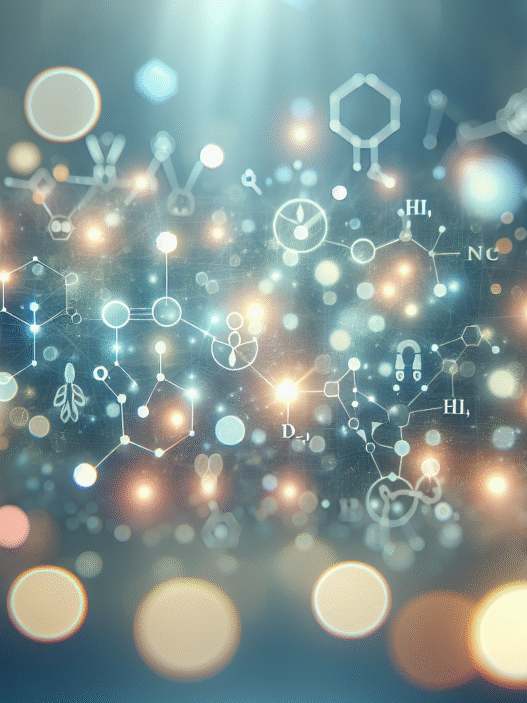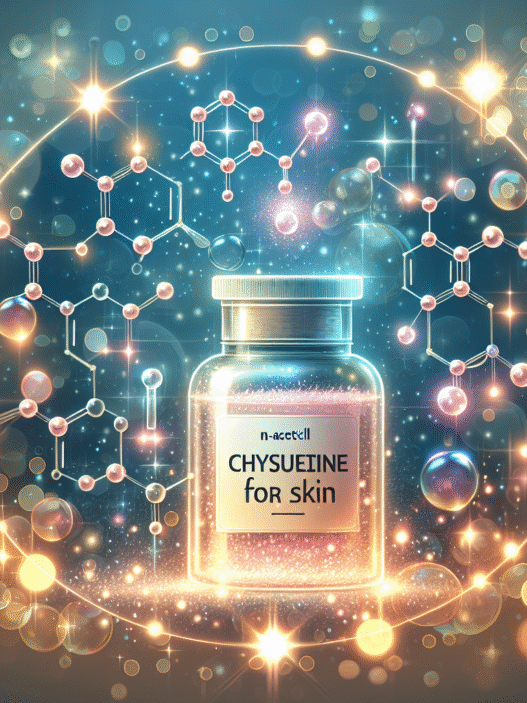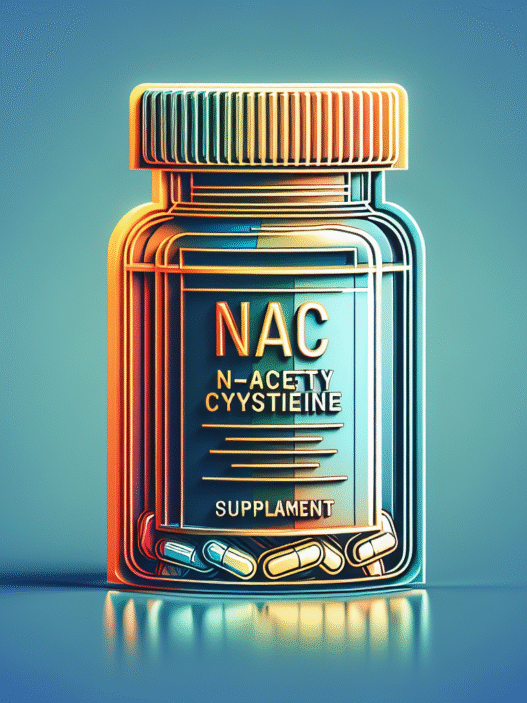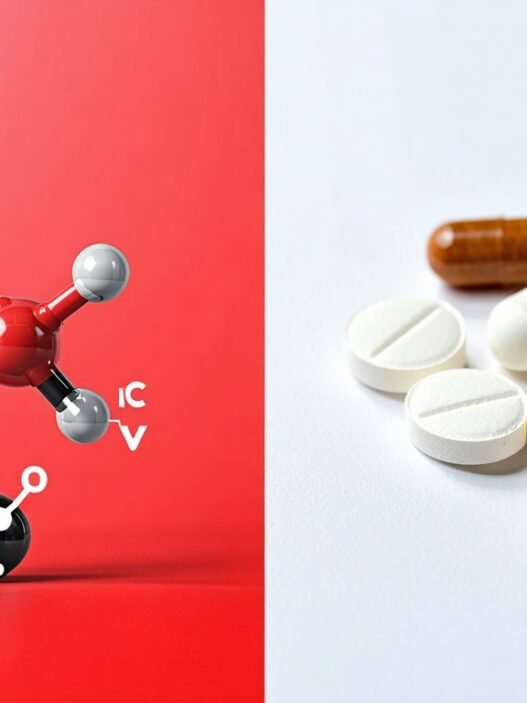Understanding NAC for Skin Health
Importance of Glutathione
N-Acetylcysteine (NAC) plays a pivotal role in supporting the body’s natural antioxidant systems, primarily by replenishing and maintaining levels of glutathione. This compound is among the most crucial antioxidants in the body and is essential for neutralizing free radicals, which can lead to cellular damage and accelerate aging processes. Studies suggest that NAC is necessary for the synthesis and replenishment of glutathione along with two other amino acids, glutamine and glycine. This connection between NAC and glutathione makes it a crucial supplement for individuals concerned about skin health, aging, and overall longevity.
Role in Environmental Protection
In addition to its foundational role in antioxidant production, NAC contributes significantly to protecting the body against environmental stressors. Glutathione, supported by NAC, helps shield skin cells from oxidative stress caused by pollution, UV radiation, and toxins. Such environmental factors can lead to premature skin aging, including wrinkles and loss of elasticity. By maintaining adequate levels of glutathione, NAC may assist in safeguarding the skin’s integrity and overall appearance, making it a valuable addition to any skincare regimen focused on longevity and anti-aging.
| Benefit | Mechanism | Source |
|---|---|---|
| Antioxidant Defense | Replenishes glutathione which neutralizes free radicals | City Skin Clinic |
| Environmental Shield | Protects skin cells from pollution and UV damage | Healthline |
For more detailed insights on how NAC impacts skin health and enhances its protective capabilities, consider exploring articles on n-acetyl cysteine benefits for skin and nac for anti-aging.
Benefits of NAC Skincare
N-acetyl cysteine (NAC) is gaining recognition in the skincare world for its potential benefits in maintaining skin health and promoting a youthful appearance. This section explores how NAC enhances skin protection, its synergy with other skincare ingredients, and its overall contribution to skin health.
Enhanced Skin Protection
NAC contributes significantly to skin protection by boosting the performance of other skincare ingredients. It helps create a healthier environment for the skin, especially during times of stress, injury, infection, and inflammation (City Skin Clinic). This protective quality allows the skin to better withstand external aggressors and maintain its integrity.
NAC is known to replenish antioxidants in the skin, combating oxidative stress that can lead to premature aging. It’s essential for skin health due to its role in supporting the synthesis of glutathione, a powerful antioxidant that protects cells from damage.
Skincare Ingredient Synergy
NAC is a versatile ingredient that complements various skincare routines. It works best in synergy with other active components, enhancing the skin’s repair and protective mechanisms. When combined with ingredients like retinol, hyaluronic acid, and vitamin C, NAC can amplify their effectiveness. This synergistic relationship can lead to improved skin texture and tone.
The ability of NAC to stimulate collagen production further enhances its appeal, potentially leading to firmer, smoother skin while reducing the appearance of fine lines and wrinkles. Research suggests that NAC Y²™ can significantly boost collagen levels, providing a plump and youthful complexion.
Promoting Skin Health
NAC promotes overall skin health by improving hydration and elasticity. Its antioxidant properties help to shield the skin from harmful environmental factors, supporting a more even complexion. As a conditionally essential amino acid, NAC nourishes the skin from within, thus contributing to its vitality.
For individuals seeking to incorporate NAC into their skincare regimen, understanding its various applications can enhance their approach. Further details on NAC’s specific benefits for skin can be found in articles about n-acetyl cysteine for skin and n-acetyl cysteine skin benefits. By focusing on both its protective elements and its ability to work with other ingredients, individuals can optimize their skincare strategies to achieve healthier, more radiant skin.
Potential Side Effects of NAC
While N-Acetyl Cysteine (NAC) is known for its numerous benefits, it is important to be aware of potential side effects that may occur with its use. This section discusses various adverse events associated with NAC supplementation.
Adverse Events Overview
General adverse events related to NAC can include a range of symptoms. Some of the most commonly reported reactions include:
| Symptom | Description |
|---|---|
| Anaphylactoid reaction | Severe allergic reaction |
| Nausea | Feeling of sickness or urge to vomit |
| Vomiting | Ejection of contents from the stomach |
| Flushing | Sudden reddening of the skin |
| Skin Rash | Unexpected rashes on the skin |
More detailed information on these adverse events can be found in the nac supplement benefits.
Hypersensitivity Reactions
Hypersensitivity reactions to NAC may manifest as anaphylactoid symptoms, which can be serious. Symptoms include:
- Airway Obstruction: Difficulty in breathing due to blocked airways
- Angioedema: Swelling of the deeper layers of the skin
- Dyspnea: Shortness of breath or difficulty in breathing
- Skin Reactions: Includes conditions such as urticaria (hives) and rashes
Individuals experiencing any of these symptoms should seek immediate medical attention. It is recommended to consult a healthcare provider for personalized guidance, especially for those with a history of allergies.
Dermatologic Side Effects
Dermatologic adverse events linked to NAC encompass skin issues, with skin rash being a common side effect. Other skin-related symptoms can include redness and irritation.
| Skin Reaction | Description |
|---|---|
| Skin Rash | Redness or bumps on the skin |
| Redness | Increased blood flow to the area |
| Irritation | Discomfort or sensitivity in the skin |
Patients should monitor their skin condition following NAC usage and report any significant changes to their healthcare provider. For more insights on the skin benefits of NAC, consider exploring the details in n-acetyl cysteine skin benefits.
Understanding these potential side effects is essential for those considering the use of NAC supplements, especially for skin health and anti-aging properties.
Health Benefits Beyond Skin
N-Acetyl Cysteine (NAC) is well-known for its remarkable health benefits that extend beyond just skin health. This section dives into three key areas where NAC makes a notable impact: antioxidant production, detoxification support, and brain and respiratory health.
Antioxidant Production
NAC plays a crucial role in enhancing antioxidant levels in the body. By aiding in the production of glutathione, one of the body’s most important antioxidants, NAC helps protect cells from oxidative damage caused by environmental factors such as UV exposure and pollution (City Skin Clinic). Glutathione neutralizes harmful free radicals, helping to maintain overall cellular health and reduce the risk of diseases associated with oxidative stress.
| Benefit | Description |
|---|---|
| Glutathione Boost | Increases levels of glutathione, providing better protection against oxidative stress. |
| Cellular Protection | Helps guard against damage from environmental toxins. |
| Skin Health | Supports overall skin health by providing antioxidant benefits. |
For more information on NAC’s properties, you can refer to our article on nac antioxidant properties.
Detoxification Support
NAC is particularly noted for its potent detoxification capabilities. It assists the body in breaking down drugs and toxins in the liver and kidneys, making it a valuable supplement for those concerned about liver health or detoxification. NAC is often administered intravenously to patients with acetaminophen overdoses to help prevent liver damage. Additionally, its antioxidant and anti-inflammatory properties can support individuals with various liver diseases.
| Benefit | Description |
|---|---|
| Liver Protection | Prevents and reduces liver damage from toxins. |
| Detoxification | Supports kidney function by breaking down harmful substances. |
| Overall Health | Potentially improves skin health through better liver functions. |
Learn more about NAC’s impact on detoxification in our article on nac supplement benefits.
Brain and Respiratory Health
NAC’s benefits extend to brain and respiratory health as well. It helps regulate glutamate levels, which is vital for brain function. Abnormal levels of glutamate have been linked to mental health conditions such as bipolar disorder, schizophrenia, and obsessive-compulsive disorder (Healthline). Studies indicate that NAC may alleviate symptoms associated with these mental health issues and reduce substance cravings.
For respiratory health, NAC acts as both an antioxidant and an expectorant. It aids in loosening mucus in the airways, thus improving symptoms related to conditions such as chronic obstructive pulmonary disease (COPD), asthma, and bronchitis. Its role in improving respiratory symptoms benefits both overall health and skin health indirectly by promoting better oxygenation and nutrient delivery.
| Benefit | Description |
|---|---|
| Brain Function | May alleviate mental health disorder symptoms by stabilizing glutamate levels. |
| Respiratory Relief | Helps manage mucus and improve breathing for better respiratory health. |
| Holistic Health | Encourages better overall well-being, potentially enhancing skin appearance. |
Explore more about NAC’s effectiveness in various health aspects in our article on n-acetyl cysteine benefits.
NAC in Skin Disorders
N-Acetyl Cysteine (NAC) has gained attention not only for its antioxidant properties but also for its potential application in various skin disorders. This section focuses on NAC’s effects on skin-picking disorders, its benefits in wound healing, and improvement in dermatologic conditions.
Impact on Skin-Picking Disorders
Skin-picking disorders, such as onychophagia (nail biting) and trichotillomania (hair pulling), can significantly impact an individual’s mental and physical well-being. Research indicates that NAC treatment has shown promise in addressing these issues. A study demonstrated that children and adolescents treated with NAC experienced a statistically significant reduction in nail-biting behavior, leading to increased nail length after the first month of treatment compared to a control group (NCBI). The efficacy of NAC provides a potential therapeutic avenue for those struggling with these compulsive behaviors.
Benefits in Wound Healing
NAC has demonstrated a pronounced impact on wound healing, primarily by promoting angiogenesis and inhibiting oxidative stress. In a controlled study conducted with diabetic and nondiabetic mice, NAC treatment significantly increased wound-breaking strength, indicating enhanced healing properties. These findings suggest that NAC may aid in the recovery of skin integrity following injury and could be beneficial for various wound-related concerns.
| Study Focus | Findings |
|---|---|
| Angiogenesis | Promotes new blood vessel formation |
| Wound Strength | Increases wound-breaking strength in studies |
| Application | Effective in both diabetic and nondiabetic subjects |
Dermatologic Conditions Improvement
NAC’s role extends beyond just improving skin integrity to include potential treatments for severe dermatologic reactions. It has shown promise in managing toxicity-induced epidermal necrolysis (TEN), a severe skin reaction that can be life-threatening. As part of combination therapy, NAC may provide relief for patients who have had unsatisfactory responses to other treatments. Its antioxidant properties can protect skin cells from damage, further supporting its use in various skin disorders.
NAC is becoming an important supplement in the field of dermatology, particularly for its effectiveness in treating skin disorders and enhancing overall skin health. For additional insights on NAC’s benefits for skin, visit our page about n-acetyl cysteine for skin and learn more about the full range of n-acetyl cysteine benefits.
Future Research and Considerations
Long-Term Effects of NAC
While initial data on the benefits of N-Acetyl Cysteine (NAC) for skin health shows promise, further extensive research is necessary to fully understand its long-term effects. Current studies highlight the potential of NAC in improving skin health, but detailed investigations are needed to uncover any lasting impacts. Future studies with a larger number of patients should aim to exclude factors that may deteriorate skin barriers, including environmental influences and lifestyle choices (PubMed Central).
Optimal Dosage and Application
Determining the optimal dosage and application methods for NAC remains a vital area of exploration. Individual responses to NAC may vary, so it’s essential for individuals to find a regimen that works best for them. Current guidelines suggest starting with lower dosages and observing how the skin responds before making adjustments. Consulting the latest research on n-acetyl cysteine dosage can provide more insights.
| Application Method | Suggested Dosage |
|---|---|
| Oral Supplement | 600mg to 1,800mg daily |
| Topical Application | Varies based on formulation |
Custom formulations may influence the effectiveness of NAC, indicating that personal experimentation and monitoring could lead to more favorable outcomes.
Consultation with Dermatologist
Prior to integrating NAC supplements into a wellness routine, it is advisable for individuals to consult with a dermatologist. Professional advice ensures that the use of NAC aligns with individual skin needs and health conditions. Dermatologists can provide personalized skincare recommendations and help assess any potential interactions NAC may have with other medications (WebMD).
For those interested in exploring the potential skin-enhancing effects of NAC, discussing options with a healthcare provider can guide appropriate usage, dosages, and potential benefits in the context of overall skin health. This approach supports safe and effective use of the nac supplement for skin.





















